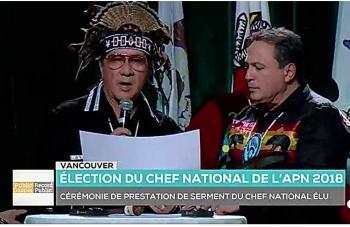Image Caption
Summary
Perry Bellegarde received a second-term mandate as national chief of the Assembly of First Nation. For all the talk of needed change of the national organization from four challengers, the chiefs or their proxies voted yesterday for the status quo.
It took two voting rounds, though Bellegarde was less than 40 votes away from the required 60 per cent of votes cast after voting round one. Katherine Whitecloud was at the bottom of the pack in the first round and, as per the rules of engagement, was dropped from the second ballot after earning only 19 votes.
Russ Diabo, who campaigned on a complete overhaul of the organization, received 40 votes. On the campaign trail he had campaigned that the AFN had strayed too far from its core values and duties to the chiefs and the people, becoming a cheerleader for the current Liberal government. In a dramatic announcement to the chiefs, which threw the election into short-term chaos, Diabo accused the Liberal government, and specifically Minister of Crown-Indigenous Relations Carolyn Bennett, of election interference.
Her crime, according to Diabo, was being onsite at the annual general assembly during the election and doing business with chiefs in their caucus rooms. He knew this because he said he saw Bennett entering the Alberta caucus as he was leaving it after putting his case for support of his campaign to the Alberta chiefs one last time.
Diabo accused Bennett of campaigning against him. Alberta chiefs were surprised at the accusation. Regional Chief Marlene Poitras told Windspeaker.com that she had invited the minister to meet with the caucus to discuss questions of concern to Alberta nations. Poitras was clear in her statement that at no time was the election or any of the candidates discussed. With all the chiefs gathered in one place, it was a convenient place and time for them to meet with the minister about their own nations’ business. In a statement sent to Windspeaker.com, the minister's office denied any interference in the election.
Diabo’s support in the second round would dwindle to 10 votes.
The two other candidates—Miles Richardson and Sheila North—would join Diabo onstage after the first voting round results were announced to raise concern about the minister’s attendance at the Alberta caucus, echoing his call of federal interference.
Frustrating them further was that the office of the chief electoral officer refused to allow the microphones to be turned on so they could state their case to the chiefs. They ended up delivering their message through nearby media and supporters and the issue soon went viral.
After the first ballot, Richardson occupied the middle with 87 votes, which would drop to 59 after the second ballot. North had 106 votes after round one and advanced to 125 after voting round two.
Bellegarde easily secured the win with a final vote tally of 328 votes, with about 63 per cent of the total votes cast.
“We have more work to do,” was Bellegarde’s rallying cry over the campaign, and the chiefs agreed, giving him a healthy mandate for business as usual for the next three years.

